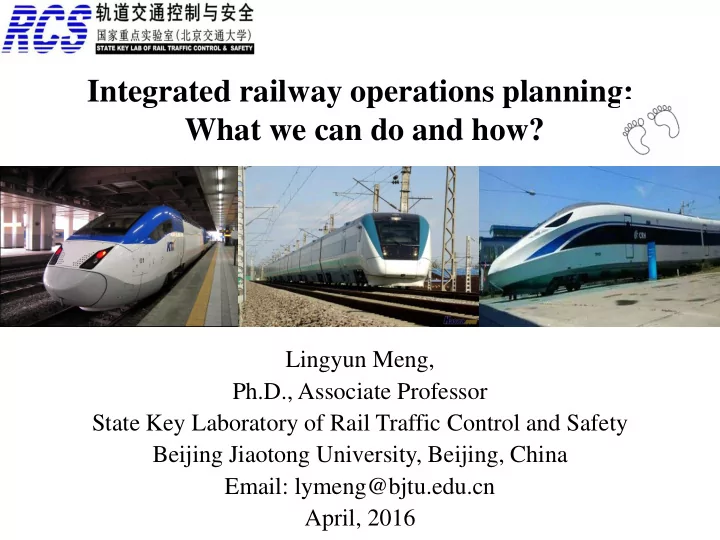

Integrated railway operations planning: What we can do and how? Lingyun Meng, Ph.D., Associate Professor State Key Laboratory of Rail Traffic Control and Safety Beijing Jiaotong University, Beijing, China Email: lymeng@bjtu.edu.cn April, 2016
Many kinds of plans- Line plan in the Netherlands April 2016, Dagstuhl Seminar, Germany
Many kinds of plans-Train timetable for Beijing-Shanghai HSR � April 2016, Dagstuhl Seminar, Germany
Many kinds of plans-Rolling stock circulation plan in the Netherlands Source: Alfieri, A., Groot, R., Kroon, L., Schrijver, A., Efficient Circulation of Railway Rolling Stock, 2006. April 2016, Dagstuhl Seminar, Germany
Many kinds of plans-Crew schedule Source: http://www.aviationsystems.co.uk/wp-content/uploads/2014/03 /Roster-Graphics.jpg April 2016, Dagstuhl Seminar, Germany
Line planning Train routing and Scheduling Traditionally Vehicle scheduling Crew scheduling April 2016, Dagstuhl Seminar, Germany
Question #1: Is it necessary to do integration? 1.1 Does practical work need integration? My own experience in a dispatching center of one Chinese railway bureau tells me YES! A train dispatcher needs to frequently communicate with rolling stock dispatcher to make sure his dispatch plan is FEASIBLE. April 2016, Dagstuhl Seminar, Germany
Question #1: Is it necessary to do integration? An integrated solution is always as least as Anita Schöbel: good as optimizing stage by stage. (Oct, 2014) Hierarchical Solution space Integrated In theory: integration seems to be promising for better solutions Existing studies in integrated line planning train timetabling : Such as: Schöbel and Schmidt (2014), Niu and Zhou (2015), Espinosa-Aranda et al. (2015) April 2016, Dagstuhl Seminar, Germany
Question #2: What are possible topics for us? Line planning Train routing and Scheduling Possible integration? Vehicle scheduling Crew scheduling April 2016, Dagstuhl Seminar, Germany
Question #2: What are possible topics for us? Line planning Possible integration? Train routing and Scheduling Vehicle scheduling Crew scheduling April 2016, Dagstuhl Seminar, Germany
Question #2: What are possible topics for us? Line planning Train routing and Scheduling Possible integration? Vehicle scheduling Crew scheduling April 2016, Dagstuhl Seminar, Germany
Question #2: What are possible topics for us? Line planning Train routing and Scheduling Vehicle scheduling Possible Crew scheduling integration? April 2016, Dagstuhl Seminar, Germany
Question #2: What are possible topics for us? Line planning Possible integration? Train routing and Scheduling Vehicle scheduling Crew scheduling April 2016, Dagstuhl Seminar, Germany
Question #2: What are possible topics for us? Line planning Train routing and Scheduling Possible integration? Vehicle scheduling Crew scheduling April 2016, Dagstuhl Seminar, Germany
Question #2: What are possible topics for us? 2.1 Are there any interesting integration topics? 2.2 Are there any integration-related research topics? Someone doubted already about this and listed similar methods (for finding research topics) in job shop scheduling research area. Thus we need to find integration topics with real demand from practice and research point of view. April 2016, Dagstuhl Seminar, Germany
Question #3: Challenges if we do integration? 3.1 How complex it will be if we optimize a joint problem? Still NP? NP1 + NP2 More complex? 3.2 How can we guarantee that we can find better solutions in a larger solution space efficiently? Hierarchical Integrated April 2016, Dagstuhl Seminar, Germany
Question #3: Challenges if we do integration? 3.3 Does “integration” mean “a holistic framework with sub -models which are solved iteratively ”? 3.4 Integrated models normally yield in decision variables with high dimensions, then how do we deal with curse of dimensionality? 3.5 If we build an integrated model and we want to do decomposition, how? In a different way from iterative approach. April 2016, Dagstuhl Seminar, Germany
Question #4: How do we meet the challenges? 4.1 Can solution algorithms with parallel computing techniques can solve integrated problems to satisfactory solutions efficiently? 4.2 How much time do we need before we see some substantial processes? 2 years, 5 years, or longer? We need domestic and international collaboration to do integration. April 2016, Dagstuhl Seminar, Germany
Ongoing research topics 1. Demand-oriented vehicle routing scheduling for a transport system Xuesong Zhou, Arizona State University 2. Integrated railway traffic control and train control Francesco Corman, Xiaojie Luan, TUDelft Yihui Wang, Beijing Jiaotong University April 2016, Dagstuhl Seminar, Germany
Ongoing research topics 1. Demand-oriented vehicle routing scheduling for a transport system Based on a state-space-time network An integer programming model with vehicle and infrastructure capacity constraints Solved by Lagrangian relaxation and dynamic programming April 2016, Dagstuhl Seminar, Germany
A special issue on Part C journal about integrated approaches
Expected topics in the special issue The topics of interest include, but are not limited to, the following: • Demand-oriented line planning and train timetabling • Integrated optimization of train timetabling, rolling stock and crew scheduling • Streamlined train operations planning, infrastructure and rolling stock maintenance scheduling • Traffic control and train control for demand-oriented urban transit • Train, rolling stock and crew real-time rescheduling. Welcome to submit a paper to the issue if you have one and no destination journal decided Deadline is May 1st
INFORMS RAS Problem Sovling competition Integrating train timetabling and maintenance task scheduling down Line_2 25 24 down up 45 52 53 44 28 1 2 3 12 13 14 22 23 26 37 38 42 43 55 27 46 49 50 51 down down 11 15 39 54 48 Line_1 Line_1 34 35 58 17 up up 4 5 8 9 10 20 21 16 29 30 33 36 40 41 47 56 57 18 19 7 31 32 6 down up up Line_2 https://www.informs.org/Community/RAS/Problem-Solving- Competition To be announced soon! Work together with Dr. Francesco Corman from TUDelft
Lingyun Meng, Ph.D., Associate Professor State Key Laboratory of Rail Traffic Control and Safety Beijing Jiaotong University, Beijing, China Email: lymeng@bjtu.edu.cn April, 2016
Recommend
More recommend